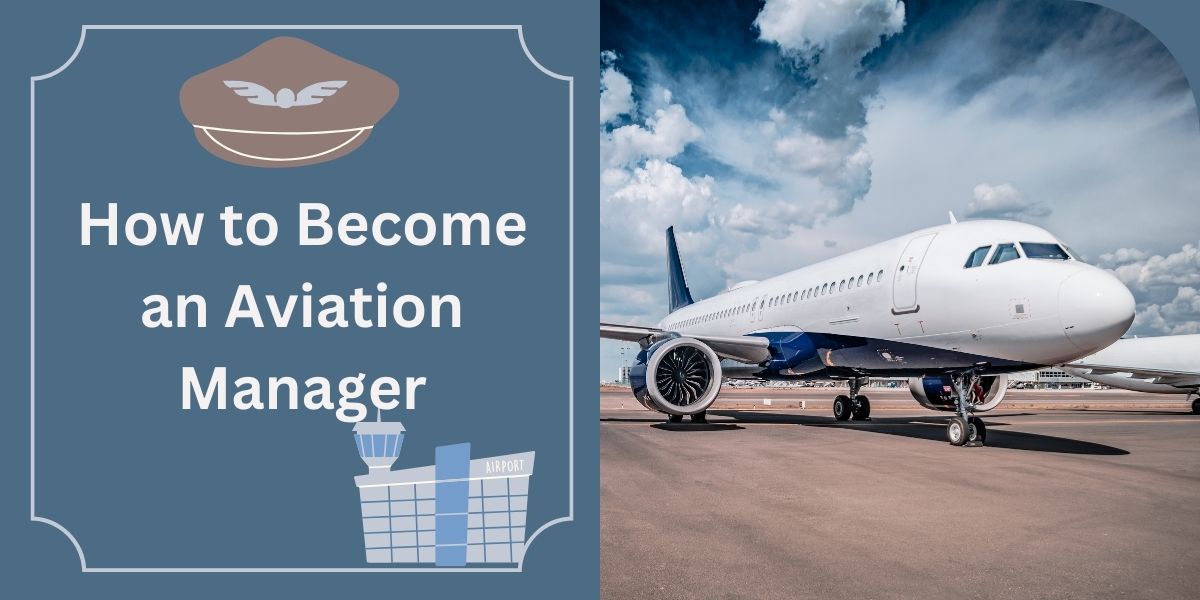Embarking on the journey to become an aviation manager is a dynamic and rewarding career path. Professionals with effective leadership skills and an interest in air travel might consider pursuing a career as an aviation manager.
Aviation managers are individuals who work in a management capacity for airlines, airports, private jet companies, and other aviation organizations.
In this article, we will discuss how to become an aviation manager, the requirements, job outlook, and salary.
What is an aviation manager?
An aviation manager typically oversees airport operations and ensures all practices adhere to local and federal regulations. They typically aim to promote efficiency, safety, and teamwork among airport personnel. An aviation manager’s responsibilities might include:
- Maintaining records of aircraft maintenance
- Preparing financial documents
- Creating employee schedules
- Supervising staff while they complete tasks
- Scheduling inspections of equipment
- Coordinating responsibilities with emergency service professionals
- Managing departmental budgets
- Developing training programs for staff members
These professionals might work unconventional hours based on flight schedules, so many aviation managers plan to work some weekend, holiday, and night shifts throughout the year. Some aviation managers might work for an airline or an aircraft manufacturing company rather than an airport.
Their duties might shift slightly to align with business needs, but regardless of their employer, aviation managers often lead teams of aviation professionals, offering specialized expertise regarding air travel.
How to Become an Aviation Manager
Here are seven steps you can follow to effectively pursue a job as an aviation manager:
1. Earn a bachelor’s degree
Prospective aviation managers typically earn a bachelor’s degree in a relevant field.
Many educational institutions offer a degree in aviation management or airport management, but you could also pursue a related major such as business administration, finance, or aerospace engineering.
Aviation management is an interdisciplinary field, so it might be helpful to take classes that cover topics, including:
- Business law
- Management styles
- Aviation insurance
- Marketing
- Corporate finance
- Human resource management
- Aviation administration
- Airport design
- Safety management
You might also complete an internship as part of your degree. Interning for or at a local airport, airline, or aircraft manufacturer can help you gain practical experience, develop network connections in the aviation industry, and practice the skills you learn in classroom settings.
Some programs also offer direct experience by granting students access to a fleet of training planes.
2. Earn a certification
Many employers prefer candidates with professional certifications. The American Association of Airport Executives (AAAE) issues the Accredited Airport Executive (AAE) credential to qualified professionals who demonstrate an understanding of airport management.
You can earn this certification by passing a 180-question exam, writing a research paper, and interviewing with a board of certified AAEs.
To apply, it’s important to hold a bachelor’s degree or earn eight years of managerial experience in an airport. If you don’t yet meet the criteria, you can become a Certified Member (CM) of the AAAE and pursue your AAE certification when you’re eligible.
You could also pursue a Certified Aviation Manager (CAM) certification through the National Business Aviation Association (NBAA). If you possess two years of professional aviation industry experience and some level of formal education ranging from an associate’s degree to a graduate degree, you might be eligible.
Professional licenses can also help you qualify to pursue a CAM certification. Candidates who meet the requirements can earn a CAM credential by passing an exam and submitting two letters of recommendation.
3. Gain industry experience as an aviation manager
Many aviation management professionals work in the industry for several years before advancing to a managerial role.
Pursuing an entry-level position can help you develop expertise and gain experience in different departments in an aviation business. Some entry-level positions that could help you begin your aviation career might include:
- Flight operator
- Airline customer service professionals
- Airport crew scheduler
- Airport or airline marketing coordinator
After you gain some experience, you might choose to pursue more advanced roles. These positions often help professionals develop leadership skills and give them an opportunity to refine their management style. As you progress in your career, you might consider jobs such as:
- Ramp services manager
- Air traffic control supervisor
- Director of Airport Operations
- Terminal manager
- Airport shift manager
4. Develop relevant skills as an aviation manager
Aviation managers typically possess a unique skill set that spans many disciplines. Here are some of the primary skills you can focus on improving before pursuing aviation manager roles:
- Communication: Effective communication skills are vital for managers. In these roles, you might complete responsibilities such as explaining complex information, resolving conflicts among staff, writing training materials, and answering questions through phone and email conversations. Consider strengthening your interpersonal communication skills and learning about the principles of organizational communication to craft precise, on-brand messaging on behalf of an airport, airline, or manufacturer.
- Industry regulation knowledge: Aviation managers ensure compliance with federal and local regulations for air travel, so you must maintain a thorough understanding of all relevant guidelines to pursue these roles. It might be helpful to research the Federal Aviation Administration (FAA) and Transportation Security Agency (TSA) laws and study how airports enforce these policies. Regulations can change, so try to research updates frequently to learn about the most relevant information.
- Leadership: Leading teams is a core function of an aviation manager. It might be helpful to develop leadership skills such as motivating staff, delegating tasks, making important decisions, and developing business strategies. You can practice leadership skills and develop your leadership style even before you secure a managerial position by volunteering to lead projects and attending courses and workshops in leadership and management.
- Financial Expertise: While aviation managers aren’t finance professionals, they often perform tasks such as managing budgets and preparing financial reports. An understanding of corporate finance may help you excel in this role and make financially beneficial recommendations. It might be helpful to study areas such as risk management, resource allocation, and market analysis to develop a budget and marketing strategy that is more likely to maximize profits and reduce waste.
5. Write a resume
When you’re ready to apply for aviation manager roles, it’s important that your resume accurately reflect your qualifications. Consider listing your aviation industry experience, highlighting relevant skills and knowledge, and including your degrees and certifications.
It may be helpful to include a specific resume objective detailing how you hope to improve airport functions for your prospective employer. For example, you might mention that your objective is to implement rigorous training initiatives and reorganize work processes to optimize employee performance.
6. Interviews for managerial positions
A successful interview might increase your chances of securing a job. Interview questions might test your knowledge of air travel regulation and aviation science, so it’s helpful to review these principles before an interview.
A hiring manager might also ask you behavioral questions to gain insight into your management capabilities. Try to discuss experiences in which you made effective strategic decisions, successfully guided a team, led a project, or implemented a more cost-efficient, productive system.
7. Update your certifications as an aviation manager
Professional organizations often expect certified professionals to pursue constant growth. It’s important to meet these expectations to ensure that your certifications remain current.
To maintain your AAE credential, plan to complete 55 hours of continuing education every three years, including seminars, approved industry events, and relevant college classes.
CAM certifications also expire every three years, but you can renew your certification by paying a maintenance fee and completing a master’s program, taking approved courses and webinars, or attending NBAA events.
How much does an aviation manager make?
The average annual pay for an aviation manager in the United States is $63,008 a year. That’s approximately $30.29 an hour. This is the equivalent of $1,211/week or $5,250/month.
While ZipRecruiter is seeing annual salaries as high as $142,000 and as low as $21,000, the majority of Aviation Management salaries currently range between $37,500 (25th percentile) and $75,000 (75th percentile), with top earners (90th percentile) making $117,500 annually across the United States.
The average pay range for an aviation manager varies greatly (by as much as $37,500), which suggests there may be many opportunities for advancement and increased pay based on skill level, location, and years of experience.
Working Hours and Conditions for an Aviation Manager
The working hours and conditions for an aviation manager can vary depending on the specific role, the size and nature of the aviation operation, and individual company policies. Let’s take a look at the working hours and conditions specific to an aviation manager
Working Hours
As airports, airlines, and other aviation businesses are often 24/7 operations, you are likely to work on a shift system, including evenings, weekends, and public holidays. In emergencies, you may be required to work or be on call for long periods of time.
Conditions
You would usually work in an office at an airport and spend time inside airport terminal buildings, hangars, and warehouses. You may also spend some time outdoors in all weather conditions.
Job Outlook for an Aviation Manager
The employment of aviation managers is projected to remain neutral.
As more people fly for both business and pleasure, the number of flights per day to and from all airports, and for many airlines, will continue to increase.
This will result in larger airports becoming busier and longer hours of operation for smaller airports. Many airports are also being upgraded and extended to accommodate additional flights and larger aircraft.
All of these factors will result in increased demand for professional aviation managers across the industry. However, increased costs faced by airlines and resulting cost-cutting will put increased pressure on the number of job opportunities for aviation managers in the immediate future.
Conclusion
Becoming an aviation manager is a journey that requires a blend of education, experience, and leadership skills. Focus on developing strong leadership and communication skills, stay updated on industry trends, and consider pursuing advanced qualifications for career growth.








